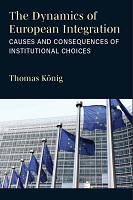The Dynamics of European Integration
External Review of Whole Manuscript
Causes and Consequences of Institutional Choices
| dc.contributor.author | König, Thomas | |
| dc.date.accessioned | 2024-03-25T13:05:41Z | |
| dc.date.available | 2024-03-25T13:05:41Z | |
| dc.date.issued | 2024 | |
| dc.identifier | OCN: 1410723671 | |
| dc.identifier.uri | https://library.oapen.org/handle/20.500.12657/88735 | |
| dc.description.abstract | In Europe’s recent history, there have been several challenges to the strength of the European Union—Brexit, COVID, financial crises, and global tensions—bringing an increased need to understand the ways that the European Union (EU) could successfully stay together or fall apart. In examining how the European Union has changed since 1993, important puzzles have emerged, including how national government functions are transferred to the EU without reforming the EU, how increased transparency is announced while decisions are approved in informal meetings, and how the effects of the polarizing rise of Euroscepticism can be managed to still promote the formation of solidarity and trust among Europeans. To understand these puzzles, Thomas König introduces a new theory of (supra)national partyism to help explain the causes and consequences of choices made by political leaders for Europe. He uses a game-theoretical perspective to look at how conditions for leaders change through accessions of new members, shocks, and crises, and separates institutional choices into two different games played by office- and policy-seeking political leaders—the interstate summit game and the national game of party competition. The Dynamics of European Integration reveals how the reorganization of electoral systems can harness dissensus and polarization among diverse national constituencies to enable the promotion of solidarity and trust in the EU. | en_US |
| dc.language | English | en_US |
| dc.subject.classification | thema EDItEUR::J Society and Social Sciences::JP Politics and government | en_US |
| dc.subject.classification | thema EDItEUR::J Society and Social Sciences::JP Politics and government::JPS International relations::JPSL Geopolitics | en_US |
| dc.subject.classification | thema EDItEUR::N History and Archaeology::NH History::NHD European history | en_US |
| dc.subject.other | European integration, institutional choices, dynamic analysis, post-Maastricht period, partyism, liberal intergovernmentalism, postfunctionalism, affective polarization, European identity, game-theory, technocracism, camp-building, governance design, transfer of policy competences, political leaders, interstate bargains, causes and consequences, Brexit, COVID, financial crisis, global tension, supranational partyism, national partyism, game theory | en_US |
| dc.title | The Dynamics of European Integration | en_US |
| dc.title.alternative | Causes and Consequences of Institutional Choices | en_US |
| dc.type | book | |
| oapen.identifier.doi | 10.3998/mpub.12828486 | en_US |
| oapen.relation.isPublishedBy | e07ce9b5-7a46-4096-8f0c-bc1920e3d889 | en_US |
| oapen.relation.isFundedBy | c081c393-743c-416d-a9d4-419ff683949c | en_US |
| oapen.relation.isbn | 9780472133512 | en_US |
| oapen.relation.isbn | 9780472039685 | en_US |
| oapen.relation.isbn | 9780472221639 | en_US |
| oapen.pages | 221 | en_US |
| oapen.remark.public | Funder name: Muhlenberg College | |
| peerreview.anonymity | Double-anonymised | |
| peerreview.id | d98bf225-990a-4ac4-acf4-fd7bf0dfb00c | |
| peerreview.open.review | No | |
| peerreview.publish.responsibility | Scientific or Editorial Board | |
| peerreview.review.decision | Yes | |
| peerreview.review.stage | Pre-publication | |
| peerreview.review.type | Full text | |
| peerreview.reviewer.type | External peer reviewer | |
| peerreview.title | External Review of Whole Manuscript | |
| oapen.review.comments | The proposal was selected by the acquisitions editor who invited a full manuscript. The full manuscript was reviewed by two external readers using a double-blind process. Based on the acquisitions editor recommendation, the external reviews, and their own analysis, the Executive Committee (Editorial Board) of U-M Press approved the project for publication. |

